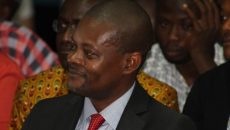The newly elected Sen. Darius Dillon brought about a breath of fresh air to Liberian politics when he announced at his induction ceremony that he was declaring his assets and that the declaration would be made public a few days later.
The announcement, while expected from him, was remarkable, given that politicians from both the executive and legislative branches (including opposition figures) have been unwilling to publish their own assets declaration, despite many calls from the public to do so.
It took a week longer than the senator promised before the results were released, but on Monday, August 26, Liberians were able to see Dillon’s declared assets. They included two bank accounts that had the equivalent of US$101, a vehicle that was valued at US$40,000 and a house that was valued at US$35,000. In total, that amounts to US$75,101, although the tallying on the form inexplicably brought the amount to US$76,000.
That Dillon’s declaration was so simple made it easy to understand. However, the gross oversimplification leaves some information missing and a lot of questions to be answered. For one, there was no mention of Dillon’s last employer, along with the dates of employment. As presented, the public is led to believe that Dillon has never been employed – but that cannot be true, as the senator himself has noted in the past that he previously worked as chief of staff in the legislature for the then-senator Jewel Howard-Taylor. Moreover, is Dillon saying that in his role as vice-chair for political activities of Liberty Party, he was a volunteer and never received income from the party? If so, why not state that his salary for that role was US$0?
Even if he was not employed immediately before being elected, at some point in the past, Dillon worked for someone or some entity, and the form allows for that specification. Moreover, Dillon’s declaration that he has no sources of income while noting that he has no loans or other liabilities is not believable. How does a man with a wife and children provide for his family without having any source of income at all? Even if his wife is the breadwinner, the Code of Conduct specifies that family interests should be declared.
Another anomaly noticed in the declaration is that the vehicle identification number provided does not return any information when searched online. Additionally, only the manufacturer of the vehicle is presented – Toyota; no model or year is listed. Such information could allow others to independently verify the value of the vehicle. Moreover, it is not clear what the appraisal of Dillon’s home is based on – the document simply states that it is worth US$35,000.
Overall, the new senator’s declaration suggests that not much rigor was applied in compiling the document or that there was an intent to deceive the public by withholding key information necessary for understanding Dillon’s interests.
The point of declaring assets is not just to declare for the sake of declaring. It’s there to allow us to understand the sources of income our leaders have, in order to be able to infer what may influence them. Government officials have control over public funds and assets, and they can award government contracts and make laws and policies. While we would hope a public official would never dip into these funds, award contracts to entities that they have a stake in for personal gain, or make laws in their personal interests, transparency from the start helps to keep them honest.
By being transparent, the people will be better able to spot potential conflicts of interest and hold their leaders accountable, should illicit enrichment be suspected.
According to the Organization for Economic Cooperation and Development’s Asset Declarations for Public Officials: A Tool to Prevent Corruption document, “a well-designed and operational system of asset declarations can be an important element in the overall anti-corruption and integrity system of a country.â€
The OECD document lists some of the more common goals of asset declaration:
- Increasing transparency and the trust of citizens in public administration — disclosures show the officials have nothing to hide.
- Preventing and resolving conflicts of interest and promoting integrity within their institutions.
- Monitoring wealth variations of politicians and civil servants to dissuade them from misconduct and protect them from false accusations, and to help clarify the full scope of illicit enrichment or other illegal activity by providing additional evidence.
Dillon’s declaration does little to increase transparency and build trust in his leadership. Not only does Sen. Dillon need to show he has nothing to hide and promote integrity, but he also needs to be as transparent as possible immediately to build trust with the Liberian people and prove just how serious he is about fighting corruption. That can only be accomplished through a more thorough and honest declaration of his assets, liabilities, income, and interests. If he needs a template on how to do this, he only needs to examine a past declaration from former President Ellen Johnson Sirleaf.
Featured photo by Zeze Ballah



